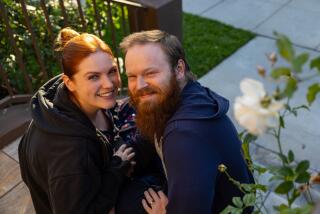Frittering Away the Biological Clock
- Share via
Women are made to have babies. The desire to procreate and nurture life is hard-wired into most of us, yet pressures to rein in this drive mount daily. To speak out for the right to commence on our biological clocks at high noon instead of waiting till almost sunset is almost unheard of--and certainly not PC.
At a clinic where I work, a 14-year-old gave birth to a son. She had been married in another country. Her husband, some years older than she, was employed doing manual labor; not a glamorous job, but it paid enough to support wife and little boy.
The young doctor assigned to give prenatal care to this teenage mother was at first upset that one so young was to be burdened with the constant care of a creature not all that much younger. But I pointed out that such a lifestyle was normal in the parents’ agrarian culture. The physician remained skeptical. Only after the mother came back for her postpartum visit lovingly holding the infant, who was growing like a weed on his diet of mother’s milk, did she finally relent and admit that mom and baby were made for each other.
Fourteen is a little young to begin parenthood in a culture as complex as our own. But take the opposite extreme. A friend of mine began to work as a medical assistant in a posh infertility clinic. Many of the “clients,” she told me, were in their late 30s or early 40s, drove their Mercedeses and BMWs into the parking lot and sipped latte while awaiting their appointments. They had bought the line that career comes first and only after that was securely in place could they think about having a child. Sadly, by then it was too late for many.
Two other young women, both married and studying in medically related fields, recently told me about the negative vibes they got from friends and colleagues when they brought up the subject of having kids. One was urged to complete her studies first, because parenting was just too hard to combine with studies. No one mentioned the possibility that it might not be any easier when she had a full-time job. Should she never have children? The other recalled how, when she had casually mentioned to someone that three children sounded just about right for her, she was berated for her lack of environmental sensitivity.
Few of the young women being lobbied so hard to frustrate their natural function as childbearers are told of the health consequences of childbearing delayed or denied. The risk of breast cancer is somewhat increased in women who have had a therapeutic abortion prior to a full-term pregnancy, yet decreased a bit by breast-feeding. Ovarian cancer has long been known to be more prevalent in those who have never borne children. Most physicians would agree that the 20s are a great age, physiologically speaking, to have a child. The risk of having a baby with Down syndrome and the consequences of the mother having a medical condition are at their lowest among twentysomethings. And yet increasing numbers of women, hearing the siren voice of career and seeing the Charybdian rocks of social condemnation, choose to delay having that child till they’ve done it all. The Powers That Be, meanwhile, are perfectly happy to scrunch women into a male mode of life--career first, family way behind--rather than creating life tracks that accommodate both women’s talent and their biology.
Delayed childbearing may be even more damaging than we think. Ectopic pregnancies, which occur in the Fallopian tubes rather than the uterus and can cause life-threatening hemorrhage in the mother, are up 600% since 1970. These malpositioned pregnancies coincide with an increase in the mean age at marriage and at first live birth, are highest in women over 30 and minority women, and are attributed to sexually transmitted diseases or increased use of drugs and surgery to induce ovulation. Delaying babies doesn’t translate into delaying sexual activity, which increases the chance of acquiring a bug that can damage reproductive apparatus or worse.
It seems to me that women’s organizations should be at the forefront of this battle, because many women’s health, happiness and lives are at stake. Childbearing by those who desire to do so should be facilitated when women are at their biological prime. And that is a lot earlier than we’d like to think.


